- Home
- John Jakes
The Americans Page 30
The Americans Read online
Page 30
Will was actually trying to plan his future. Certain things about it were already evident. For one, he knew that if he were to find a place in Society, he’d have to do it on his own. Even if he wanted to live off the Kent fortune—which he didn’t—the money would never provide an entrée to the best circles; it was too new.
The Kent name wouldn’t help, either. Might be a hindrance, in fact. Besides the notorious Ward McAllister encounter, there was something else cloudy, even sinister, about Gideon’s past, something to do with the death of a man named Thomas Courtleigh.
No one ever said Gideon was responsible for Courtleigh’s death. But Will’s father had been in Courtleigh’s office when Courtleigh was killed in mysterious circumstances. Will had also gotten strong hints at home that Courtleigh was the person responsible for his stepmother’s stabbing at the same time. He remembered that part vividly. For days, he and Carter had kept a vigil at Julia’s bedside, expecting her to die. Gideon had gone to Chicago, beside himself with anger and grief. And while he was in Chicago, Thomas Courtleigh had been shot to death—
Whatever else was unclear about the whole affair, one thing was certain. It had left the Kent name permanently tainted.
The rain pelted Will’s face. He blinked and looked around. He’d walked all the way to the fifties on Fifth Avenue. Fifty-second Street was just ahead. On his left rose the huge, fortresslike triple brownstone built by William Henry Vanderbilt. Both Vanderbilt and his father, the old Commodore, had been immensely wealthy. Neither had been accepted into Society. Yet one of William Henry’s sons, William K. Vanderbilt, was now one of Society’s leaders. His wife was the woman who had humbled Mrs. Astor.
He crossed Fifty-second to the northwest corner, and the house Mrs. William K. Vanderbilt had commissioned Richard Morris Hunt to design. Depending on your views about mixing the architecture of a French chateau and a Renaissance palace and erecting the result on Fifth Avenue at a cost of three million, the mansion was a masterpiece or a monstrosity.
For Will the house had special significance. With luck and diligence, you could climb higher than your parents had been able to climb. You could escape the limitations they had placed on themselves—and you—by reason of their birth, occupation, and behavior. To most Americans, that sort of highly visible accomplishment was epitomized by admission to Society.
Will genuinely wanted to help others. That was why medicine held such a strong appeal for him. But he also wanted to fulfill his promise—and, not incidentally, disprove his dead mother’s accusations. This morning, in the rain, he was overwhelmed by a conviction that there was only one way for him to realize both ambitions, and that was to live on a footing equal with the country’s elite.
It was a thoroughly American goal, he reminded himself. The half-French, half-English bastard who’d founded the Kent family had shipped to the colonies for precisely the same reasons—to escape the limitations of his past and better himself.
William K. Vanderbilt’s mansion perfectly summed up Will’s new, sharply focused ambition. It was the kind of house he wanted to own someday. It was inhabited by the kind of people with whom he wanted to associate. He leaned against the stone stoop of the mansion, studying the roofline with an envious expression. Suddenly the front door flew open.
A man in the maroon livery of the Vanderbilts appeared, gazing down through the rain to where Will stood on the sidewalk.
“No loitering on these premises. Move along!”
By God he would find a way to make his chosen career bring him all this. Abruptly, then, he knew he must take an important precaution before the family returned to Boston—and certainly before he tackled the medical school entrance examinations. He had to speak with a doctor of the kind Gideon had described. A wealthy, successful city practitioner. Before he invested four years in a hard program of study, it would be wise to verify that there were doctors who lived well from their profession.
“I said move along!” the footman called. “If you don’t, we’ll flash a message to the precinct house.”
Will grinned and held up his hands in a peacemaking gesture. “All right, I’m going.” He started to walk backward. “But I’ll be coming to visit one of these days. I’ll be invited.”
The footman stood gaping from his shelter under the massive stonework blazoned with acorns and oak leaves, the emblems of the family. Will did a kind of impromptu jig on the sidewalk, paying no attention when a hack rolled through a puddle and sprayed him with muddy water.
“Invited here?” the footman said to himself, closing the massive door. “He’s utterly mad. What is happening to New York?”
ii
The staff of the Union included a reporter who specialized in scientific subjects. Will went to see him at Gideon’s suggestion, though he didn’t tell his father the precise reason for the visit. He merely said he wanted to do some investigation of the medical field. Gideon seemed to approve.
The reporter was cordial when Will dropped in, and agreed to help him contact one of the town’s better doctors.
“I suppose you want to speak with the most skillful man you can find?”
“Skillful? Not necessarily. I want to meet a successful one.”
“There’s a difference?”
“To me there is.”
The reporter frowned, less friendly now. The next day he sent a list of names to the hotel. One name was underlined, with a marginal notation.
* Said to have a net worth in excess of one million. This would make him most “successful” of those listed.
Will fumed over the cynicism. But he soon pushed aside his annoyance. All that mattered was locating a prosperous doctor who would answer some candid questions. That, the reporter had done.
Cyrus Coates Vlandingham, M.D.
Even the name had the ring of success.
iii
Dr. Cyrus Coates Vlandingham conducted his practice in a number of large homes in and adjacent to Stuyvesant Square. Here dwelled what was called the Faubourg Saint-Germain Set—New York’s oldest and most prestigious families, aristocrats who refused to follow the “new swells” who were moving uptown to Fifth Avenue.
Vlandingham maintained a tiny office near Madison Square, but this was solely for handling his books. He had no consulting rooms. Will sent his note to the bookkeeping office. After two days he received a reply. Dr. Vlandingham agreed to meet him, but it would have to be at Sherry’s, where the doctor always lunched when in the city. Vlandingham’s note then made gratuitous mention of summering in Newport, a small resort town on an island in Narragansett Bay. Forty or fifty years earlier Newport had been a popular warm-weather retreat for Southern rice and cotton planters. Now it was beginning to attract some of the better New York families.
Will put on his best outfit and took a hack to Sherry’s at the appointed time. A pompous head waiter with gleaming patent leather pumps and waxed mustache points bowed him to Dr. Vlandingham’s regular table in a quiet alcove.
The doctor was in his late fifties. A husky man, broad-shouldered, with a midsection resembling a prize pear. Large dark eyes and a deep, hearty voice instantly inspired confidence. He wore expensive clothes.
Will marveled at the nonchalance with which Vlandingham ordered luncheon and wine for both of them—in French.
As the waiter glided away, Vlandingham said, “I am of course familiar with your family, Mr. Kent. And with your father’s newspaper. A Socialist rag, if you don’t mind my saying so. The Union’s soft position on the Haymarket bombers is particularly dangerous to American institutions. Men like those anarchists waste the time of our judiciary. They’re animals and they’ve proved it. They deserve lynching, not due process.”
From the pocket of his waistcoat the doctor took a small gold box. Out of the box came a gold toothpick. “But your note said you were contemplating a medical career, not one in journalism.”
“That’s right, sir.”
“Happy to hear you’ve chosen something respectable.” An
unctuous smile. Then Vlandingham began to work the gold toothpick between two lower front teeth.
Will resented Vlandingham’s remarks about the Union, although he’d heard similar criticism many times before. He supposed it was a tribute to the power of his father’s newspaper that the doctor had agreed to this meeting in spite of his disgust with the Union’s editorial viewpoint.
Presently the doctor finished probing between his teeth and laid the toothpick aside. An obsequious sommelier served the wine. There was an elaborate ritual involving the drawing of the cork, Vlandingham sniffing it, the waiter pouring a little into Vlandingham’s glass, and the doctor sipping. After ten seconds of frowning reflection, he gave a nod of approval. At that point the waiter filled both glasses.
“I believe you’ll enjoy the wine,” Vlandingham remarked as he took another sip. It’s an unpretentious but frolicsome little Vouvray.” To Will it tasted like a cold, faintly sweet white wine, nothing more. He knew the fault was with himself, not the wine. He was increasingly in awe of the doctor.
“By the way, Mr. Kent, lest we conduct this interview on the basis of mistaken assumptions, I must inform you that my practice does not lend itself to apprentices. I have never had one, in fact.”
“I’m not looking for an apprenticeship, sir. If I can pass the entrance tests next month, I plan to study at Harvard.”
“Oh, do you. Well, university training seems to be the preferred method these days. I was educated under the apprentice system, and I remain partial to it.” A purse of the lips, quick and self-satisfied. “It is the method advocated in the Hippocratic oath.”
They drank more wine.
“Have you decided to undertake any specialized training at Harvard, Mr. Kent?”
Will smiled. “No, Doctor, I hadn’t thought that far. I’m just starting to cram for the entrance tests.”
“A specialty is no laughing matter, sir! It can be highly lucrative. I’d suggest you consider one in particular. The treatment of female diseases.”
He leaned back, twirling his wineglass. “It’s a specialty which neither taxes the practitioner’s intelligence nor unduly dominates his time. That’s because all female complaints, from prolapsus uteri to nervous headaches to various cancers, have but one source—the uterus. And one cause—some deficiency therein. Despite the claims of a few crackpots, the old, familiar treatments are still the best. I refer to application of leeches—injections—cauterization. Do consider it, sir. It can be worth a great deal of money to you. Especially in a well-to-do neighborhood.”
At that, Vlandingham allowed himself a smile. Will was impressed.
Primed by the wine, the doctor grew less formal. He draped an arm over the plush banquette and said, “Harvard’s supposed to have a good medical school. The trouble is, too many universities are employing professors who teach radical rot. Listerism—”
He gave the word a dirty sound. Will had done some reading about Joseph Lister. The English surgeon believed in using carbolic acid to prevent transmission of infection. Lister had stated the idea more than twenty years before, but it still was not universally accepted. Even some of the Harvard medical faculty violently opposed it, Vlandingham wanted to be sure Will had no doubt about his opinion.
“Listerism is nonsense. Only last week, I treated a young female patient afflicted with a mild case of puerperal fever. One hour later I supervised the delivery of another patient’s fine infant son, and I saw no need to perform foolish, ritualistic hand-washings in between. Of course it might be a sensible precaution for doctors who must work in the public almshouses, and in general hospitals. There the air is usually foul, and consequently a carrier of disease.”
The disdainful expression on Vlandingham’s face said that of course he never found it necessary to enter such low establishments. Still, a hand-washing might have been in order, Will thought. The doctor’s fingernails looked none too clean.
After pouring more wine, Vlandingham raised his glass.
“Here’s to your ambition, Mr. Kent. Now in what specific way may I be of assistance?”
Will began his carefully planned appeal. “I need advice, Dr. Vlandingham. Can I look forward to a decent future if I study medicine? I believe it’s a doctor’s duty to help as many people as he can. It’s that aspect that started me thinking about medical school in the first place—”
“Laudable, very laudable.” But Vlandingham had lost interest. Even as he spoke, he was shifting his attention to three fashionably dressed young women at a nearby table. His eyes grew moist as he watched them.
Will went on. “On the other hand, I don’t want to become a doctor and starve.”
Vlandingham’s chuckle had an arch sound; Will had recaptured his interest. “Do I appear to be starving, Mr. Kent?”
“No, but—maybe you’re an exception.”
“Quite right. I am an exception because I have chosen to be. You can make the very same choice.”
Will shook his head, dubious. “A lot of people, my own father among them, tell me that being a doctor means being a pauper too.”
“People who say that are thinking solely of run-of-the-mill physicians. Short-sighted mediocrities who permit their altruism to override their common sense. I was born amid the rocks of New Hampshire. Early on, I decided I would never tolerate the sort of poverty my father endured in a lifetime of farming. When I finished my apprenticeship I married a young woman of poor health but impeccable family connections. She’s long dead now, God rest her—”
Again his eyes slid across the rim of his glass to the breasts of one of the young women. A sip, a delicate belch, then he dabbed his lips with the back of a veined hand and continued.
“The various entrées my wife provided before her untimely death enabled me to establish a practice which now earns in excess of one hundred thousand dollars per year. How much in excess we shall leave to your imagination. But I assure you, Mr. Kent—it is entirely possible to practice the healing arts without wearing the hair shirt. Does that answer your question?”
“Yes, Doctor. It does.”
“Excellent! Believe me, doctors who go hungry have chosen to go hungry. They regard their oath as more important than the contents of an investment portfolio—an error I do not make, I assure you. Then, having engineered their own failure, they point an accusatory finger at any physician who is successful.”
Vlandingham noted a flicker of uncertainty in Will’s eyes. He leaned forward. “One must not, of course, leave the impression that nothing matters except profit. The practice of medicine is important in and of itself. But I make no apology for plying my skills among those who can best afford to pay. Each physician serves a certain segment of humanity either by chance or by choice. Some choices, however, are incomprehensible. My older brother is also a doctor. Growing up in New Hampshire together, we were quite close. He had one queer streak in his makeup, however. He seemed to consider our father’s toil on the farm acceptable. Even ennobling, somehow. Ridiculous, eh? My brother and I started on the same road. Our paths soon parted, however. Clement married the daughter of the man under whom he served his apprenticeship. An old country practitioner. A misguided dodderer who believed his first obligation was to his patients, not himself. My foolish brother caught that disease and hied himself to the worst slum in this city—”
“He practices in New York?”
Vlandingham nodded. “The need was keenest in the slums, he said with that superior air I quickly came to loathe. Perhaps he likes the slums because he has no competition. Everyone wants to practice in my part of town. Only a madman or a hack would choose his. But he’s stayed there to this day, surviving God knows how. His wife died eighteen months ago, worn-out by helping him eke out a pathetic living. We never see one another. I can’t stand his odor of failure. Or his stupidity.”
Vlandingham finished his wine. “Why should a doctor choose to serve any segment of humanity except the best? The answer is he shouldn’t. Not if he possesses an iota of intellig
ence or self-esteem. No, Mr. Kent,” he concluded in a reflective way, “be neither ashamed of your desire to make money in medicine, nor doubtful of your ability to do so.”
Will watched his host with admiring eyes. Overwhelmed by Vlandingham’s worldliness and hence persuaded by his arguments, he silently agreed with everything the doctor said. Cyrus Coates Vlandingham was obviously a successful man, and one worth emulating. When Will went into practice, his hands might be cleaner, but his style of life would be comparable. And by means of his skill, he’d rise to the topmost level of Society and leave the other Kents and their questionable reputation far behind.
The waiter arrived with plates bearing silver dishes. In each dish, raw oysters on the half shell rested on a bed of rock salt. Vlandingham made an appreciative murmur, then added a final thought.
“The splendid thing about medicine is that it can serve the practitioner as well as the patient. One must only remember to put first things first—”
His brown eyes slid past Will to one of the young women at the nearby table. She had raised her arm. Now she lowered it, concealing the lush curve of her breast. Vlandingham sighed, then noticed Will watching.
He broke into a big smile, winked and said, “First things first—eh, Mr. Kent?”
Will smiled too. “Absolutely.”
“I believe you’ll make a very intelligent doctor.” So saying, Vlandingham attacked his first oyster with a small silver fork. Part of the oyster refused to come free of the shell. With no hesitation, the doctor laid his fork aside and resorted to his fingers. He popped the remaining bit of oyster into “his mouth, ate it with lip-smacking gusto, then licked his fingers one by one.
CHAPTER XV
JOURNEY’S END
i
THE LATE SEPTEMBER DAY carried a bitter foretaste of winter. The sky was gray, the wind gusty, the intermittent rain unusually cold. The rain grew heavier just as Will reached the foot of the massive marble staircase. It had a set of steps on each side, leading up to a landing and the main entrance of the Harvard Medical School.

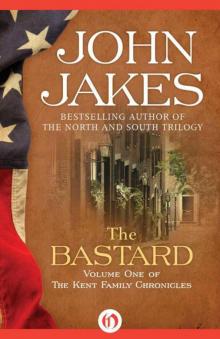 The Bastard
The Bastard The Furies
The Furies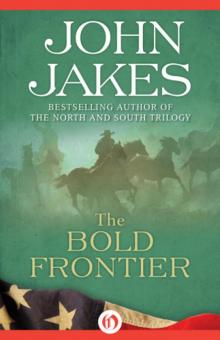 The Bold Frontier
The Bold Frontier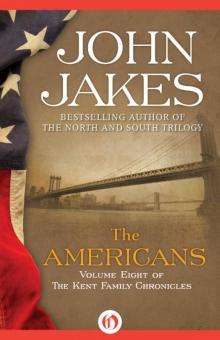 The Americans
The Americans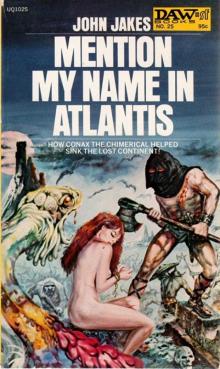 Mention My Name in Atlantis
Mention My Name in Atlantis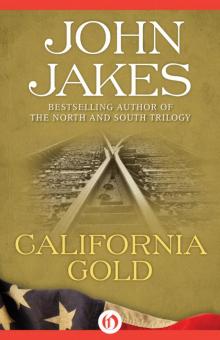 California Gold
California Gold North and South
North and South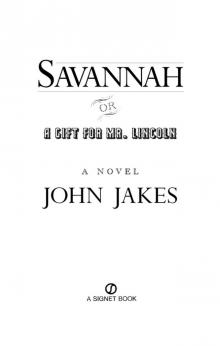 Savannah, or a Gift for Mr. Lincoln
Savannah, or a Gift for Mr. Lincoln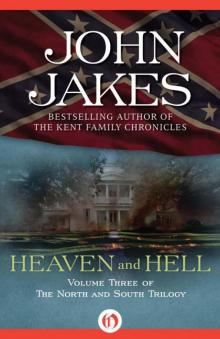 Heaven and Hell
Heaven and Hell Homeland
Homeland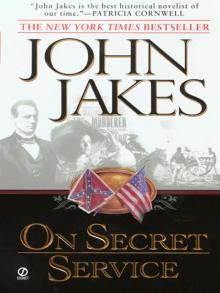 On Secret Service
On Secret Service The Lawless
The Lawless The Titans
The Titans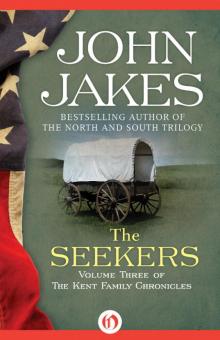 The Seekers
The Seekers Love and War
Love and War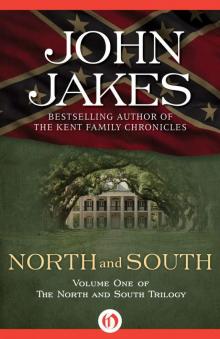 North and South: The North and South Trilogy (Book One)
North and South: The North and South Trilogy (Book One) North and South Trilogy
North and South Trilogy Love and War: The North and South Trilogy
Love and War: The North and South Trilogy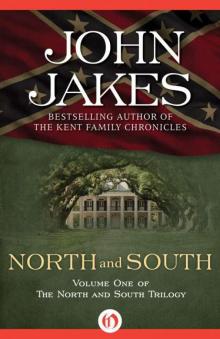 North and South: The North and South Trilogy
North and South: The North and South Trilogy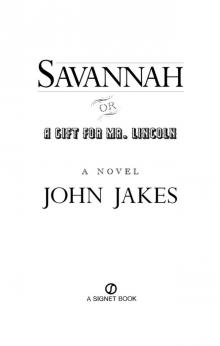 Savannah
Savannah Lawless
Lawless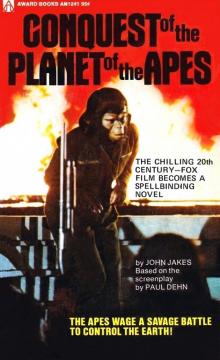 Conquest Of The Planet Of The Apes
Conquest Of The Planet Of The Apes Love and War: The North and South Trilogy (Book Two)
Love and War: The North and South Trilogy (Book Two) The Rebels: The Kent Family Chronicles
The Rebels: The Kent Family Chronicles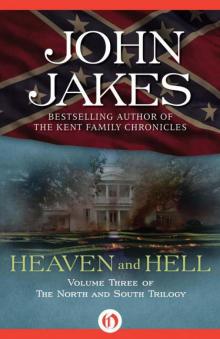 Heaven and Hell: The North and South Trilogy
Heaven and Hell: The North and South Trilogy Planet of the Apes Omnibus 2
Planet of the Apes Omnibus 2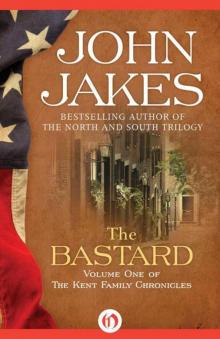 The Bastard: The Kent Family Chronicles
The Bastard: The Kent Family Chronicles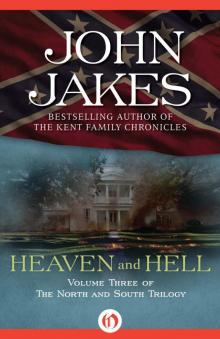 Heaven and Hell: The North and South Trilogy (Book Three)
Heaven and Hell: The North and South Trilogy (Book Three)